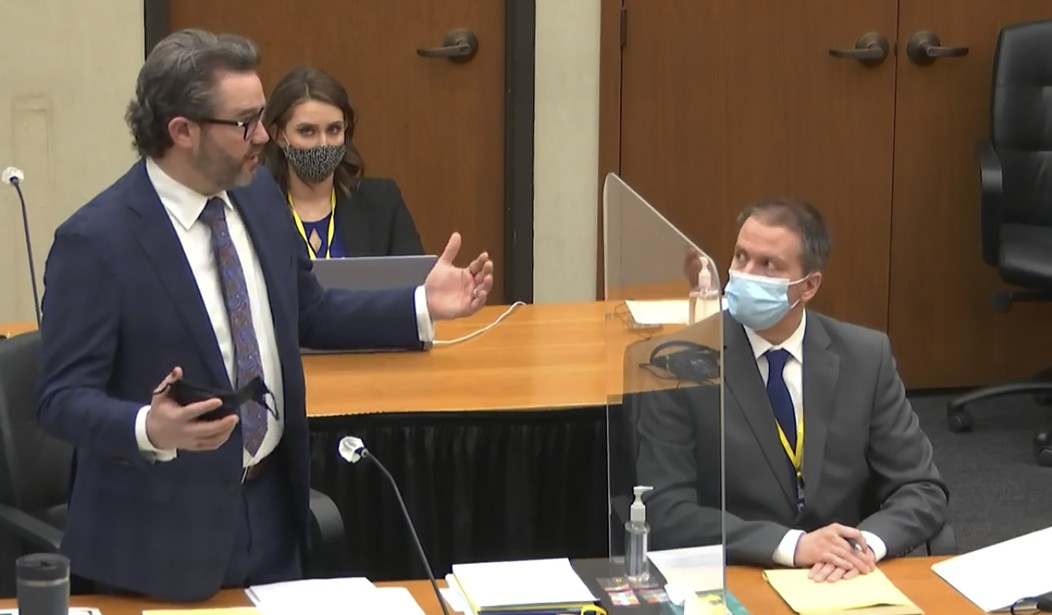The jury has now gotten the case of former Minneapolis Police officer Derek Chauvin in the death of George Floyd. And so begins the jury’s sequestration in a city that is the site of riots, looting, and nearly non-stop protesting – especially since the death of another man in a nearby suburb at the hands of police.
In the eleven months since Floyd’s death, Minneapolis has erupted into riots, looting, protests, and arsons, which have been replicated in Portland, Kenosha, Seattle, Washington, D.C., and several other American cities.
Related: Who Are the Jurors in the George Floyd Case – and Are They Safe?
The jury goes into sequestration under heavy security. They were told last week to bring a packed bag on Monday after closing arguments and jury instructions.
As I reported in PJ Media, the jury is comprised of a multiracial group of five men and seven women. The demographic breakdown is three black men, one black woman, and two self-identified “multiracial” people with the rest identifying as caucasian.
Related: Former Cop Chauvin Won’t Testify, Defense Rests in Death of George Floyd. Now, About Those Riots…
A change of venue from Minneapolis was denied by the judge early in the proceedings.
Many of the jurors reported having seen viral video of the police restraining Floyd.
Though jurors have been told to stay away from the news, they haven’t been told not to look out their windows at boarded-up businesses, National Guard troops on the streets, or kids’ schools closed because of the trial.
Related: Prosecution Rests in Chauvin Trial and the Jury Is Told to ‘Pack a Bag’
In their closing arguments, prosecutor Steve Schleicher urged jurors to “believe your own eyes.” He said it was all over a $20 fake bill. He urged jurors to remember that George Floyd lay on the ground for nine minutes and 29 seconds. Nine minutes and 29 seconds became a mantra during the prosecutor’s close. He asked the jurors to find him guilty of all charges against him, which doesn’t make much sense, but he was urging them to find Chauvin guilty of something: “This wasn’t policing, this was murder. The defendant is guilty of all of them and there’s no excuse.”
Defense attorney Eric Nelson drilled the idea of what a “reasonable police officer” does during the course of a stressful situation. He brought up the drugs in Floyd’s system, his high blood pressure, heart problems, and struggling or fighting with police and told the jury, “I would submit that it is nonsense” that those other physical ailments had no impact on his death last May 25th, which is what almost all the state’s medical experts testified to during the trial. Except one: the medical examiner, who is the only person to do the autopsy on Floyd and who concluded that the death was caused by a “multi-factorial process,” not just one thing – Chauvin, which is what the state is selling.
Chauvin is charged with second-degree unintentional murder, third-degree murder, and second-degree manslaughter.
The Minneapolis Star Tribune breaks down the charges against Chauvin and their penalties:
For a conviction of second-degree unintentional murder, the state’s prosecutors will have to show beyond a reasonable doubt that Chauvin caused Floyd’s death while assaulting him. This is the most serious charge and carries a presumed sentence in this case of 10 3⁄4 years to 15 years…
[…] Third-degree murder requires prosecutors to prove that someone caused the death of another “by perpetrating an act eminently dangerous to others and evincing a depraved mind, without regard for human life. […] It also carries a presumptive sentence in this case of 10 3⁄4 years to 15 years, according to state sentencing guidelines.
[…] In order to convict Chauvin of second-degree manslaughter, prosecutors will need to show beyond a reasonable doubt that he was “culpably negligent” and took an “unreasonable risk” with Floyd’s life when he restrained him and that his actions put Floyd at risk of death or great harm. This charge carries a presumptive sentence of 41-57 months.
If he’s found guilty, the defense will undoubtedly move for a retrial – held somewhere else, where there are no riots.










Join the conversation as a VIP Member